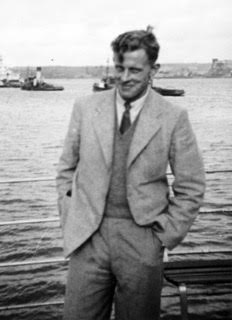More on Fairlynch and the Delderfields
Many people admired the excellent exhibition to mark R.F. Delderfield’s centenary last year, staged by Fairlynch volunteer Margaret Brett with much valuable material contributed by the author's biographer Marion Lindsey-Noble. They may like to know that both Delderfield brothers had dealings with

Pictured above is one of the many books by Eric Delderfield (1909-95). Brought up in Exmouth like his brother Ronald, he published a range of works about the West Country with a focus on local history.

Following an approach by the Friends of Fairlynch Secretary Marjorie Evison in April 1971 he gave a talk six months later to the Friends of Fairlynch in the Church Institute next to The Green in Budleigh Salterton. Entitled ‘Historic Houses of the West’ it was based on his book West Country Historic Houses and their Families, the second volume of which had been published in the previous year.

In his response to the Friends of Fairlynch Secretary Marjorie Evison’s invitation to speak he was somewhat apologetic about the cost involved. “I am afraid that the demands on my time for lecturing all over the West Country is such that I have been forced to make a charge for everyone now - but would be prepared to do this at a reduced fee of £3.15p including expenses if this would suit.”

Nine years passed and the list of Eric Delderfield’s publications continued to grow, as did apparently his approval of what was happening at Fairlynch. He responded warmly to Marjorie Evison’s suggestion that he might officially open the Friends’ Summer Coffee Morning and Annual Garden Sale in the Temple Methodist Hall and Garden on 26 July 1980. “I shall be pleased to do this,” he wrote, “as apart from anything else, I have a tremendous admiration for the dedication which so many of your Committee and helpers devote to the excellent museum which is such a credit to Budleigh Salterton.”
The occasion was a great success. Various stalls sold goods, including
handicrafts made for the sale and the Budleigh Salterton Handbell Ringers entertained
the crowds. It was felt that the official opening by the famous author,
accompanied by his wife, had given a good start to the event, which raised a
gross total of £158.88.

There’s every reason to think that Ronald Delderfield would have been a useful supporter of Fairlynch. He was always ready to support local causes and in later life was a prominent defender of Woodbury Common when it was threatened by development. "As locals told me last year during the centenary celebrations, Ron was so popular not only because he wrote lovely novels but also because he was a passionate defender of truth and rights, forever helping out with campaigns and missions by writing scathing and passionate articles," says Marion Lindsey-Noble.

At one stage he’d lived in Budleigh Salterton
and was a good friend of Dr Tom Evans, the town’s GP. Some three months after
her first letter to Eric Delderfield, in April 1971, Marjorie Evison learnt
that his even more successful brother, author of best-selling novels like A Horseman Riding By would be willing to give a talk to the Friends
of Fairlynch. Clearly excited at the
prospect of a visiting celebrity at the Museum she wrote to Ronald Delderfield
at Dove Cottage, his Sidmouth home. “I hope you will come to see the present
display at the Museum - if you should come in I would very much like to explain
our efforts to you. If I am not there,
the steward on duty could telephone me, and I could be down within a few
minutes - always provided I am in, of course!”

The author was indeed happy to give a talk the following year - and there was no mention of a fee! “March 2nd, afternoon, would suit me,” he wrote back. “I will put it in the diary but would appreciate a reminder a day or so before, as I am very absent-minded.” As for the subject of the talk he suggested: “Suppose I read one or two local comic essays from my autobiographies & explain the use of backgrounds in between?” He was in fact at that time working on an autobiography, For My Own Amusement, published in 1972. In that book he discusses the inspiration for the storylines of his novels and tells in anecdotes the origin of several of his characters. Delderfield believed that authors draw inspiration from the scenes of their youth, and called his sources “character farms”, the main ones being his childhood in Addiscombe,
Sadly Ronald Delderfield’s talk was not to be.
On 26 February of that year he wrote to Marjorie Evison: “I feel I must apologise in writing
for unavoidably cancelling our engagement, but I am sorry to say I have not
been at all well lately and I have, as I explained to you on the telephone, an
appointment with a specialist in town on March 2nd. I do hope you will be able
to find a replacement at such short notice, and can only offer my apologies
again.”

Almost four months later, on 24 June at Dove Cottage, he died from lung cancer at the tragically early age of 60. Gifted with his particular sense of humour which so often portrays the farcical nature of human affairs, especially seen in autobiographies like his Nobody Shouted Author, Delderfield would no doubt have appreciated the irony of what he had written in his first letter to Marjorie Evison. “I am always a little hesitant about booking this far ahead in case I am whisked away at the last minute but there are no plans for promotion tours in March.”





Comments
Post a Comment